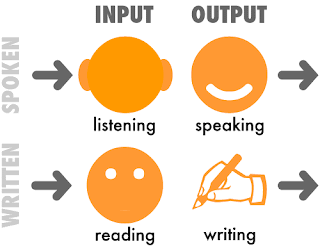Week 6
Used To
For a quick refresher, you can look at the grammar on page 72 including the grammar bank on page 140.
You can also do the listening exercise on page 75. You will find the listening tracks below.

Proving Receptive Skills
Most of our examples in the previous weeks have focused on what are sometimes known as the productive skill areas - the ones on the right of the picture to the right. This week we will look a little at the so-called receptive skill areas and how to go about including those skills in our portfolios.
One way to go about dealing with receptive skills is to think about how you work with texts, whether that text is written or oral. You could take the statement from the CEFR "Can summarise long, demanding texts" ("Common European Framework of Reference for Languages: Learning, teaching, assessment" 26) and put your own summary of a long, demanding text into your portfolio. Or similarly with note-taking and the statement "Can take detailed notes during a lecture on topics in his/her field of interest, recording the information so accurately and so close to the original that the notes could also be useful to other people" ("Common European Framwork" 26)." In either case, this would be the artifact for the statement and then you can elaborate in your reflective statement.
With other skills, it depends on what you are focusing on in your self-assessment. If you want to focus on, say, understanding TV and film, you could choose one of the statements from there to demonstrate. You might choose the statement "Can follow films employing a considerable degree of slang and idiomatic usage" ("Common European Framwork" 10). Then you could choose a film that had a large amount of slang in it (say Sweet Sixteen, which was hard for me to understand with its heavy use of Scottish dialect) and show that you managed to follow the film. You can do this through such methods as summarizing or keeping a list of the slang that you encounter in the film. Your reflective statement could go into details about how much you were able to understand and where difficulties were and so on.
With reading, you might want to focus on the skill of being able to "long and complex factual and literary texts, appreciating distinctions of style" ("Common European Framwork" 6). There you might include the texts in your portfolio and include your own description of the various styles that are being employed by the authors of the texts. This is the kind of skill where work from other classes might come in handy, such as any response papers you write in your literature classes.
Overall, there are many ways to demonstrate different aspects of receptive skills. Some have also been explored by your classmates in setting goals. You need to choose the ways that work best for you to demonstrate the skills you mentioned in your self-assessment.

